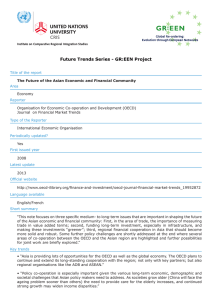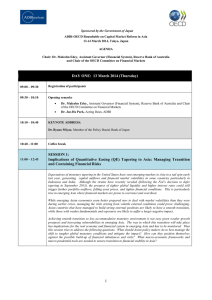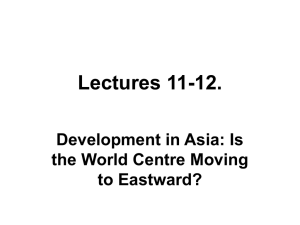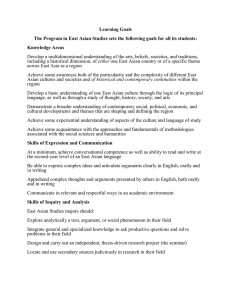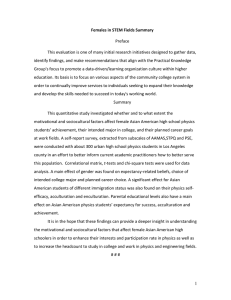Day 1 Tuesday, 7 February 2012 OECD-ADBI 12
advertisement
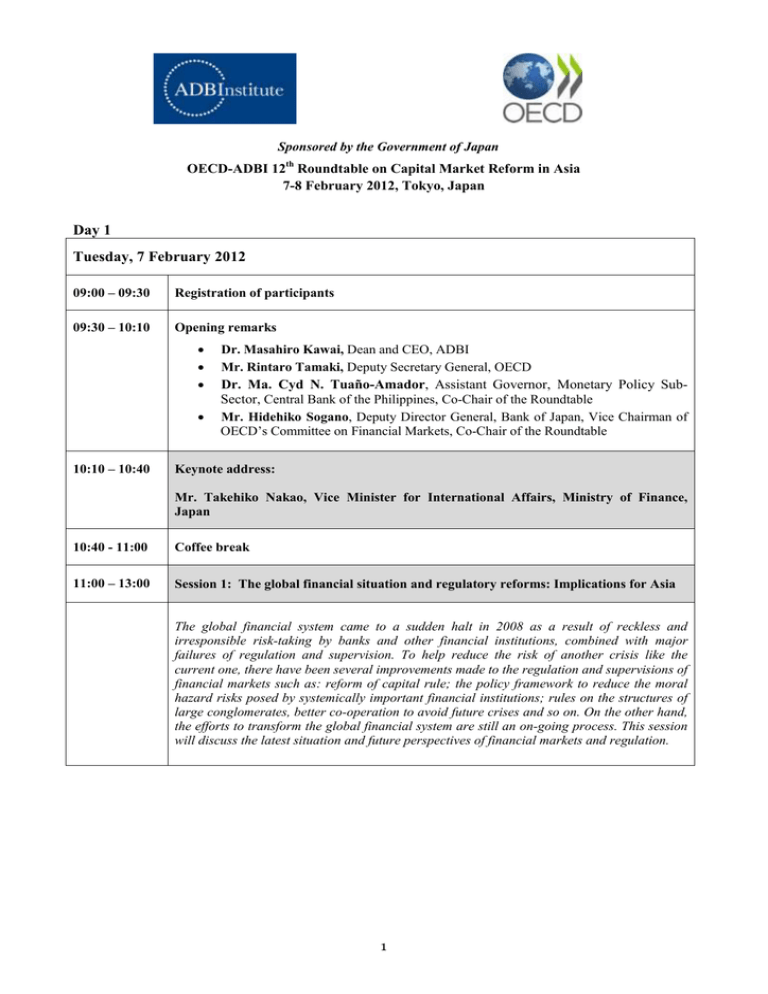
Sponsored by the Government of Japan OECD-ADBI 12th Roundtable on Capital Market Reform in Asia 7-8 February 2012, Tokyo, Japan Day 1 Tuesday, 7 February 2012 09:00 – 09:30 Registration of participants 09:30 – 10:10 Opening remarks 10:10 – 10:40 Dr. Masahiro Kawai, Dean and CEO, ADBI Mr. Rintaro Tamaki, Deputy Secretary General, OECD Dr. Ma. Cyd N. Tuaño-Amador, Assistant Governor, Monetary Policy SubSector, Central Bank of the Philippines, Co-Chair of the Roundtable Mr. Hidehiko Sogano, Deputy Director General, Bank of Japan, Vice Chairman of OECD’s Committee on Financial Markets, Co-Chair of the Roundtable Keynote address: Mr. Takehiko Nakao, Vice Minister for International Affairs, Ministry of Finance, Japan 10:40 - 11:00 Coffee break 11:00 – 13:00 Session 1: The global financial situation and regulatory reforms: Implications for Asia The global financial system came to a sudden halt in 2008 as a result of reckless and irresponsible risk-taking by banks and other financial institutions, combined with major failures of regulation and supervision. To help reduce the risk of another crisis like the current one, there have been several improvements made to the regulation and supervisions of financial markets such as: reform of capital rule; the policy framework to reduce the moral hazard risks posed by systemically important financial institutions; rules on the structures of large conglomerates, better co-operation to avoid future crises and so on. On the other hand, the efforts to transform the global financial system are still an on-going process. This session will discuss the latest situation and future perspectives of financial markets and regulation. 1 11:00 – 12:00 Moderator: Hidehiko Sogano, Deputy Director General, Bank of Japan Speakers: OECD Perspectives Mr. Adrian Blundell-Wignall, Deputy Director, Directorate for Financial and Enterprise Affairs, OECD European perspective Mr. Hans-Helmut Kotz, Professor, Center for Financial Studies, Goethe University, Former Member of the Executive Board, Deutsche Bundesbank US Perspective Mr. Sarkis D. Yoghourtdjian, Assistant Director, Division of Banking and Supervising Regulation, Board of Governors of the Federal Reserve System Asian Perspective Dr. Masahiro Kawai, Dean and CEO, ADBI 12:00 – 13:00 Discussants Mr. Takashi Yoshimura, Managing Director / Head of GSJCL Compliance, Compliance Division, Goldman Sachs Japan Dr. Akira Ariyoshi, Professor, Hitotsubashi University Open discussion 13:00 – 14:15 LUNCH 14:15 – 16:15 Session 2: Capital flows, policy responses and liberalization As the global economy has become more interconnected and integrated, the size and volatility of capital flows have increased significantly. In Asian countries during the current global crisis, capital inflows have increased, leading to excess liquidity with the risk of asset bubbles building up. A sudden reversal of these inflows would have negative effects on their economies. Given the impact of global capital movements on domestic financial systems as well as domestic economies, in several Asian countries certain macro-prudential regulations have been put in place, and capital controls and macro-prudential regulations have reemerged as one of the most important issues on the agenda in various international fora. This session will discuss how to develop prudent domestic financial systems under liberalised capital movement. The OECD will prepare a background note for this session, which will be written by Professor Yoshino, Keio University and this session will begin with his presentation. 2 14:15 – 15:30 Moderator: Mr. Adrian Blundell-Wignall, Deputy Director, Directorate for Financial and Enterprise Affairs, OECD Speakers: Dr. Naoyuki Yoshino, Professor, Keio University, Japan: The Global Imbalance and the Development of Capital Flows among Asian Countries Dr. Mario Lamberte, Research Director, ADBI (presentation on Managing Capital Flows, based on ADBI publication) Dr. Sung-Soo Eun, Director-General International Finance Bureau Ministry of Strategy and Finance, Korea Dr. Bandid Nijthaworn, Former Deputy Governor, Bank of Thailand, “Managing Capital Flows, the experience of Thailand ” Mr. Jeffrey Carmichael, CEO, Promontory Financial Group Australasia, Singapore, “The effectiveness of macro prudential measures to prevent financial market turmoil caused by excessive capital flows” 15:30 – 16:30 Discussants: Mr. Shogo Ishii, Director, IMF Regional Office for Asia and the Pacific, Tokyo Dr. Iwan Azis, Head, Office of Regional Integration, ADB, Manila Open discussion 16:30 – 16:45 Coffee break 3 Session 3: The Development of Regional Financial Markets 16:45 – 18:30 Session 3.1 Asian Capital Market Integration To adequately support growth rebalancing efforts in Asia, particularly in promoting domestic and intra-regional investment, capital (debt and equity) markets have a key role to play in facilitating the mobilization of surplus savings in Asia to finance needed investment within the region. This session discusses the roles and development of debt and equity markets in (East) Asia. Two key regional initiatives that are designed to further promote development of bond markets in East Asia are the Asian Bond Markets Initiative (ABMI) and the Roadmap for Financial and Monetary Integration of ASEAN (RIA-Fin). The ABMI aims to promote development of the bond markets in the ASEAN+3 countries. The main focuses are to promote demand and supply for local currency denominated bonds. On the demand side, it aims to develop institutional investors such as private pension systems, mutual funds, collective investment scheme and insurance companies while working towards the development of repo and securities borrowing and lending markets and enhancing crossborder transactions. To encourage supply of local currency denominated bonds, credit guarantee and investment mechanism will be established to enhance credit quality of the bond issues while efforts will also be made to promote Asian Currency Note program and structured finance instruments. The RIA-Fin promotes further integration of capital markets in Southeast Asia through harmonization of market practices and standards as well as linkages among bond and equity markets in the region. 16:45 – 17:30 Moderator: Dr. Masahiro Kawai, Dean, ADBI Speakers: Dr. Aladdin D. Rillo, Director and Chief Economist, ASEAN Secretariat, “ The Road Map for Financial and Monetary Integration of ASEAN” Mr. Takeshi Kurihara, Director of Regional Financial Cooperation Division, Ministry of Finance, Japan “Achievements of ABMI in the last decade and Future Challenges” Mr. Mohd Sani Ismail, Trade & Finance Specialist, Financial Sector, Public Management and Trade Division, Southeast Asia Departmen, Asian Development Bank, “Enhancing Cooperation & Regional Integration of ASEAN Equity Markets” 17:30 – 18:30 Discussants: Mr. Stephen Lumpkin, Principal Administrator (Structural issues), Financial Affairs Division, OECD Mr. Junanto Herdiawan, Senior Economist, the Bank of Indonesia Open discussion 19:00 – 20:30 Reception dinner hosted by ADBI and OECD 4 Day 2 Wednesday, 8 February 2012 09:30 – 10:00 Keynote address: Mr. Kiyohiko G. Nishimura, Deputy Governor, Bank of Japan Open Discussion Session 3: The Development of Regional Financial markets 10:00 – 12:30 Session 3.2 The Internationalization of the Yuan The internationalization of the PRC yuan is receiving increasing attention as a major development of the Asian financial system for capital as well as trade flows. Measures to liberalize the PRC’s capital account are expected to lead to increased use of the yuan for fundraising and investment both in offshore markets and in the PRC domestic market. 10:00 – 10:45 Moderator: Dr. J. H Park, Deputy Dean of ADBI Speakers: Dr. Peter Morgan, Senior Consultant, ADBI, Tokyo: The Development of the Offshore Market of the Yuan Denominated Bonds Dr. Fan Zhai, Managing Director, China Investment Corporation : Yuan’s Internationalization and the Liberalization of China’s Domestic Capital Market Mr. Zhang Chao-Yang, Deputy General Manager, Bank of China, Hong Kong 10:45 – 11:00 Coffee break 11:00 – 12:30 Discussants: Dr. C.H. Kwan, Nomura Institute of Capital markets Research Mr. Jae Young Lee, Senior Economist, ASEAN+3 Macroeconomic Research Office, Singapore Open discussion 12;30 – 13:30 LUNCH 5 14:00 – 16:00 Session 4: Financial Education and Consumer Protection in Asia During the recent global crisis, domestic private consumption in the Asian region played an important role in cushioning the negative effects of external demand shocks and acted as a driving force for the recovery. On the other hand, the household sector’s access to financial markets in the region is limited. Further financial education and consumer protection of the household sector could raise domestic private consumption in the region further through a more efficient budget allocation of the household sector. Financial education is also very important for further development of financial markets. As the complexity and risks of household finances grow, so does the necessity for strengthening financial consumer protection. The OECD plays the leading role in this fields and it developed principles for financial consumer protection which is endorsed by the G20. This session will review the progress of the general framework as well as regional initiatives on financial education, consumer protection and financial inclusion and will discuss remaining challenges for further enhancement. 14:00 – 15:00 Moderator: Mr. André Laboul, Head of the Financial Affairs Division, OECD Speakers: 15:00 – 15:45 Ms. Flore-Anne Messy, Principal Administrator, Financial Affairs Division, OECD: “the latest development of globally recognized instruments on financial education and consumer protection” Mr. Prashant Saran, Whole Time Member of Securities and Exchange Board of India (SEBI), “Indian experience and challenges on Financial Education and Consumer protection” Mr. Halim Alamsyah, Deputy Governor, Bank of Indonesia Ms. Connie Lau Yin-hing, Chief Executive, Hong Kong Consumer Council Discussants: Dr. Ma. Cyd N. Tuaño-Amador, Assistant Governor,Monetary Policy SubSector, Central Bank of the Philippines Ms. Ryoko Okazaki, Director, Head of Financial Education Group Public Relations Department, Bank of Japan and the Central Council for Financial Services Information Open discussion 15:45 – 16:00 Coffee Break 6 16:00 – 18:00 Session 5: Regulation, Supervision and Risk management of Asian banks In the latest crisis, there were problems of contagion posed by large integrated internationally active financial service groups. Asian institutions were not directly implicated in this particular crisis, as they largely avoided exposure to the wholesale funding and off-balance sheet activities at the core of the difficulties. Nonetheless, the business activities of banks in several Asian countries are expanding into capital markets and many institutions have begun to take on sizeable exposures to the real estate sector, a sector that historically has proved troublesome for banks. Such expansion needs to be accompanied by an enhancement of risk management capacities, not only in the financial firms themselves, but also in authorities charged with overseeing them. Supervisory authorities also need to develop and maintain sufficient capacities and tools to measure, detect and react to these emerging risks. On an ongoing basis, capital flows provide benefits but also pose challenges that must also be managed. The recent crisis has shown that risks in the system can hide in the interlinkages between institutions and market segments, which require a macro prudential regulatory approach. A lack of transparency regarding activity in off-balance sheet vehicles obscured the scale of maturity transformation that was taking place and the exposures large institutions had with one another and with the market. The crisis shows the necessity for authorities to review existing regulatory frameworks to ensure efficient supervision of the system as a whole in addition to the business activities of individual financial firms. Effective communication and cooperation is needed. This may be especially the case for SEA economies, which tend to have separate supervisors for financial activities. This session will review the latest developments in these areas. Another important issue is that SMEs’ accessibility to financial markets in most of the South East Asian countries is limited and needs to be improved for economic development. This includes establishing an appropriate regulatory framework covering such aspects as credit data and innovative financial institutions. 16:00 – 16:45 Moderator:Dr. Mario Lamberte, Director of Research, ADBI Speakers: 16:45 – 17:45 Mr. Stephen Lumpkin, Principal Administrator (Structural issues), Financial Affairs Division, OECD , “Risks in Financial Group Structures” Ms. Salinee Wangtal, Assistant Governor, Supervision Group, Bank of Thailand Dr. Xue Chun Zhang, Director, Bureau of Economic Research, People’s Bank of China: “Risk, Informal Finance and Banking Regulation Reform in China” Discussants Dr. Jang-Yung Lee, Former Deputy Governor, Financial Supervisory Service of Korea Mr. Gonthor Ryantori Aziz, Senior Adviser for International Policy and Organizational Capacity Development, Bapepam-LK, Indonesia Mr. Ryozo Himino, Deputy Commissioner for International Affairs, JFSA Open discussion 17:45 – 18:00 Conclusions and Closing Remarks 7
